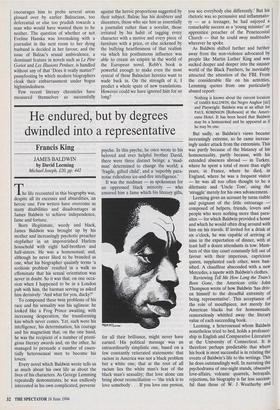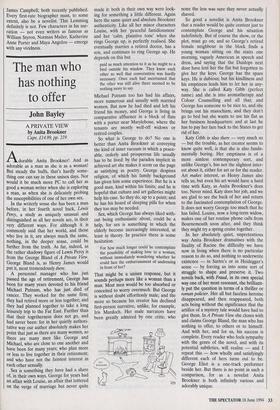He endured, but by degrees dwindled into a representative
Francis King
JAMES BALDWIN by David Leeming Michael Joseph, £20, pp. 442 The life recounted in this biography was, despite all its excesses and absurdities, an heroic one. Few writers have overcome as many disabilities and disadvantages as James Baldwin to achieve independence, fame and fortune.
Born illegitimate, weedy and black, James Baldwin was brought up by his mother and increasingly psychotic preacher stepfather in an impoverished Harlem household with eight half-brothers and half-sisters. He was a homosexual; and, although he never liked to be branded as one, what his biographer quaintly terms 'a scoliosis problem' resulted in a walk so effeminate that his sexual orientation was never in doubt. So it was that, on one occa- sion when I happened to be in a London pub with him, the barman serving us asked him derisively: 'And what for you, ducky?'
To compound these twin problems of his race and his sexuality was his ugliness: he looked like a Frog Prince awaiting, with increasing desperation, the transforming kiss which never comes. Yet, such were his intelligence, his determination, his courage and his magnetism that, on the one hand, he was the recipient of a number of presti- gious literary awards and, on the other, he managed to persuade a number of essen- tially heterosexual men to become his lovers.
Every novel which Baldwin wrote tells us as much about his own life as about the lives of his characters. As George Lemming repeatedly demonstrates, he was endlessly interested in his own complicated, perverse psyche. In this psyche, he once wrote to his beloved and ever helpful brother David, there were three distinct beings: a 'mad- man' determined to change the world; a `fragile, gifted child'; and a 'superbly para- noiac ridiculous ice-and-fire intelligence.'
It was the madman — as spokesman for an oppressed black minority — who ensured him a fame which his literary gifts, for all their brilliance, might never have earned. His political message was an extraordinarily simplistic one, based on a few constantly reiterated statements: that racism in America was not a black problem but a white one; that at the root of all racism lies the white man's fear of the black man's sexuality; that love alone can bring about reconciliation — 'the trick is to love somebody . . . If you love one person, you see everybody else differently.' But his rhetoric was so persuasive and inflammato- ry — as a teenager, he had enjoyed a remarkable success as a 'young minister' or apprentice preacher of the Penetecostal Church — that he could sway multitudes wherever he spoke.
As Baldwin shifted further and further away from the non-violence advocated by people like Martin Luther King and was sucked deeper and deeper into the sinister world of the Black Panthers, he inevitably attracted the attention of the FBI. From the considerable file on his activities, Lemming quotes from one particularly absurd report: Nothing is known about the current location of JAMES BALDWIN, the Negro Aughor [sic] and Playwright. Baldwin was at an affair for PAUL ROBINSON [Robeson] at the Ameri- cana Hotel. It has been heard that Baldwin may be a homosexual and he appeared as if he may be one.
But sadly, as Baldwin's views became increasingly extreme, so he came increas- ingly under attack from the extremists. This was partly because of the blatancy of his homosexuality, partly because, with his extended absences abroad — in Turkey, where he spent a total of more than eight years, in France, where he died, in England, where he was a frequent visitor — he was all too often thought to be a dilettante and 'Uncle Tom', using the `struggle' merely for his own advancement.
Leeming gives an account by turns risible and poignant of the little entourage composed of helpers, friends, lovers and people who were nothing more than para- sites — for which Baldwin provided a home and which he would often drag around with him on his travels. If invited for a drink at six o'clock, he was capable of arriving at nine in the expectation of dinner, with at least half a dozen attendants in tow. Mem- bers of this tiny court constantly fell out of favour with their imperious, capricious queen, supplanted each other, were ban- ished. A chauffeur absconded with a new Mercedes, a tapette with Baldwin's clothes.
Reviewing Tell Me How Long the Train's Been Gone, the American critic John Thompson wrote of how Baldwin 'has driv- en himself to the dreadful extremity of being representative'. This acceptance of the role of mouthpiece, not merely for American blacks but for homosexuals, remorselessly whittled away the literary value of each succeeding book.
Leeming, a heterosexual whom Baldwin nonetheless tried to bed, holds a professor- ship in English and Comparative Literature at the University of Connecticut. It is therefore perhaps predictable that where his book is most successful is in relating the events of Baldwin's life to the writings. This he does outstandingly well. In narrating the psychodrama of one-night stands, obsessive love-affairs, volcanic quarrels, betrayals, rejections, his biography is far less success- ful than those of W. J Weatherby and James Campbell, both recently published. Every first-rate biographer must, to some extent, also be a novelist. This Lemming definitely is not. Few characters in his nar- ration — not even writers as famous as William Styron, Norman Mailer, Katherine Anne Porter and Maya Angelou — emerge with any vividness.



























































 Previous page
Previous page